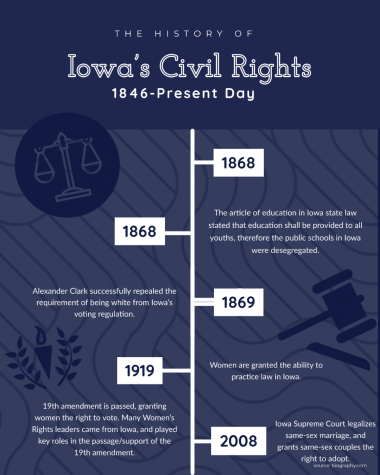The unknown history of Iowa, the radical star
WSS staffer Paige Albright ’23 takes a closer look into the civil rights history of Iowa.
When thinking about Iowa’s civil rights history, most would assume it to be entirely full of very little diversity or nothing memorable. Never would Iowa be thought of as a leader or an example for others to follow, but it has been leading the charge for many civil rights movements, since the founding of the very overlooked state. The state motto speaks to the history of their work towards the goal of a more equal country, “Our liberties we prize and our rights we will maintain.” Iowa has set the example for many reform movements, as Iowa’s desegregation of public schools was almost one hundred years before the infamous Brown v. Board of Education in 1954.

One of the most influential civil rights leaders to come from Iowa is Alexander Clark, an abolitionist during the Civil War. He was a barber for the white elites in Muscatine, this job allowed him to interact with the elites of the community. His connections allowed for him to gain support of those who could make real changes, like in 1855 when he petitioned for the repeal of the law in Iowa that prevented Black immigrants from entering the state. Although their petition was denied he did not stop working towards his goal of equality.
During the civil war, he recruited and organized Iowa’s first colored regiment. He was known as a very effective recruiter, as he gave the commission he got for each recruit back to the soldiers. After the civil war, he focused his efforts on to Black suffrage. He is often known for his famous quote discussing the hypocrisy of sacrificing yourself for a union but having no voice in it: “He who was trusted with a musket, ought to be trusted with a ballot,” became a railing slogan for many black suffrage movements. He succeeded with the redaction of “white” from Iowa’s voting regulation legislature in 1868. This then prompted the president, Ulysses Grant to follow suit with the passage of the 15th amendment allowing all men to vote.
However, Alexander Clark is best remembered for his work desegregating public schools in Iowa. After his daughter Susan was denied entrance into a school next to their house due to her skin color, he sued. The supreme court of Iowa ruled in his favor in 1868, and when the court appealed again, he won again. The article of education in Iowa state law stated that education shall be provided to all youths, and that the state shall not grant some class of citizenship privileges that are not equal. Clark v. Board of Directors happened 86 years before the infamous Brown v. Board of Education that would desegregate public schools on a national level.
Council Bluffs was home to one of the leading activists for women’s rights during the 1800s, Amelia Jenkins Bloomer. She and her Husband moved to Iowa in 1855. She was the creator/editor/publisher of “The Lily.” This publication was the first place for women to publish their own work. This allowed women to voice their opinions on topics like social reform and educate the thousands of subscribers on inequalities women face. Once Amelia and her husband moved to Council Bluffs they established co-ed public schools, and advocated for female teachers to earn the same pay as their male coworkers. Amelia served as the first president of Iowa Women Suffrage Association. Many other revolutionary women have came from Iowa; Annie Turner Wittenmyer, Carrie Chapman Catt, and Ola Babcock Miller.
The history of education for all in Iowa has been one of many triumphs, as the university of Iowa since its founding in 1855 has admitted both men and women. Women have been allowed to practice law since 1869. A state referendum was held in 1916 over whether women should be allowed to vote, however the people who were deliberating over the issue were men. Three years later the 19th amendment was passed, granting women the right to vote. Iowa was the tenth state to ratify. One of the first in the midwest.
In 1978 Iowa state legislature repealed the act that made same-sex relationships a criminal offence. Discrimination on the basis of sexual orientation, and gender identity has been outlawed in Iowa since 2007. A 2008 Iowa supreme court case stated that marriage licenses must be issued to same sex couples. A ruling in the same year made adoption by same sex couples legal. Although the state provides no protection to those who are victims of hate crimes, they are protected by a federal act which was passed in 2009.
Although Iowa has led the charge in taking steps to reduce the discrimination of the LGBTQ+ community, Iowa has failed to ban conversion therapy, and transgender citizens are denied enlistment as the Department of Defense bans “hermaphrodites.” Iowa has earned its title as the “Radical Star,” however this can not overshadow the fact that the state and the nation still has lots of work to achieve the national promise of equality for all.
Your donation will support the student journalists of West High School. Your contribution will allow us to purchase Scholarship Yearbooks, newsroom equipment and cover our annual website hosting costs.

(she/her) She is a senior this year, and she is also the Co-Managing Editor and Podcast Editor for web this year. In her free time, you can find her at...



